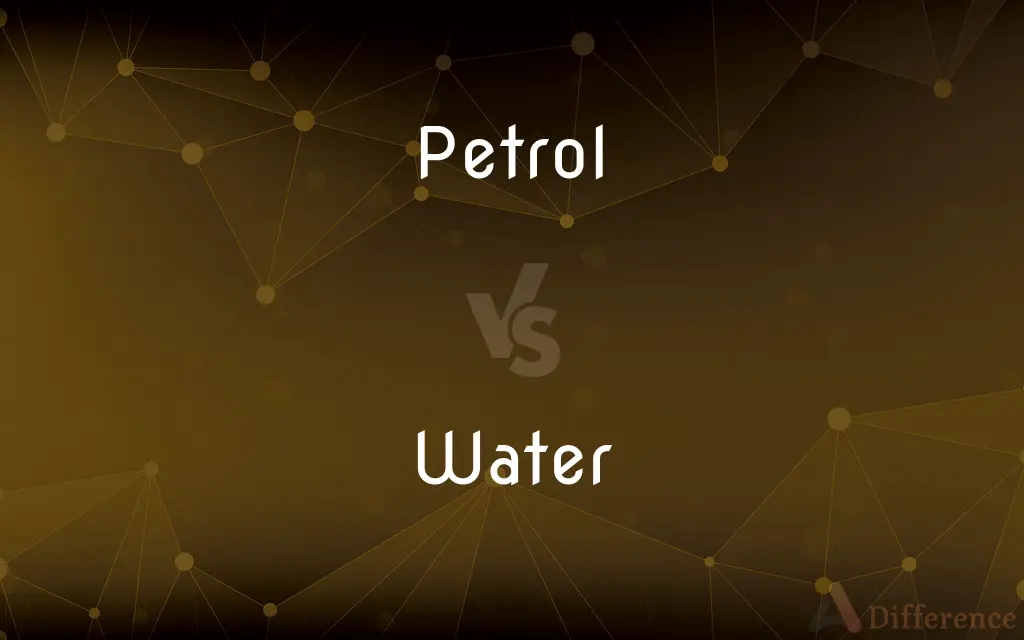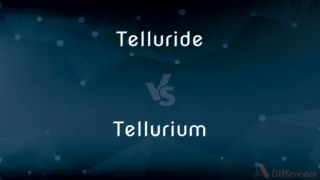Petrol vs. Water — What's the Difference?
Edited by Tayyaba Rehman — By Urooj Arif — Updated on April 2, 2024
Petrol is a flammable liquid used as fuel, while water is a colorless, tasteless liquid vital for life.

Difference Between Petrol and Water
Table of Contents
ADVERTISEMENT
Key Differences
Petrol, also known as gasoline, is a hydrocarbon liquid primarily used as a fuel in internal combustion engines. It is derived from the fractional distillation of crude oil, containing a complex mix of hydrocarbons and additives to improve its performance and stability. Water, on the other hand, is a compound composed of two hydrogen atoms bonded to one oxygen atom (H2O). It is essential for all known forms of life and covers about 71% of the Earth's surface. Unlike petrol, water is not a fuel but a solvent, and it plays a critical role in various biological, chemical, and physical processes.
While petrol is highly flammable and used for its energy content, water is non-flammable and acts as a fire suppressant. The properties of petrol make it dangerous to handle and store, requiring special safety measures to prevent fires and environmental pollution. Water, in contrast, is generally safe to handle and is often used to mitigate fires and cool substances.
The environmental impact of petrol and water usage also differs significantly. The combustion of petrol releases carbon dioxide, a greenhouse gas, contributing to air pollution and climate change. Water usage, while necessary for life, can lead to problems such as overconsumption, pollution, and the disturbance of natural ecosystems if not managed sustainably.
Despite their differences, both petrol and water are indispensable to modern society. Petrol powers vehicles, machinery, and generators, facilitating transportation and industrial processes. Water is crucial for hydration, agriculture, sanitation, and industrial applications, underscoring its fundamental role in sustaining life and economies.
Comparison Chart
Composition
Hydrocarbons and additives.
H2O (two hydrogen atoms and one oxygen atom).
ADVERTISEMENT
Usage
Fuel for engines.
Solvent, hydration, agriculture, sanitation.
Physical State
Liquid at room temperature, flammable.
Liquid at room temperature, non-flammable.
Environmental Impact
Releases CO2 when burned, contributing to pollution.
Overconsumption and pollution can disrupt ecosystems.
Safety
Highly flammable, requires careful handling.
Generally safe, used for fire suppression.
Compare with Definitions
Petrol
Derived from crude oil.
Refineries process crude oil to produce petrol and other products.
Water
Covers 71% of Earth's surface.
Oceans, lakes, and rivers are major sources of water.
Petrol
Contains hydrocarbons.
The quality of petrol depends on its hydrocarbon composition and additives.
Water
Acts as a solvent.
Water dissolves more substances than any other liquid.
Petrol
A liquid fuel used in cars.
The car's petrol tank was nearly empty after the long journey.
Water
H2O, essential for life.
Drinking eight glasses of water a day is recommended for health.
Petrol
Flammable and dangerous if mishandled.
Storing petrol in large quantities requires safety measures to prevent fires.
Water
Used in agriculture for irrigation.
Efficient water use is crucial for sustainable farming.
Petrol
Used for combustion engines.
Modern vehicles use petrol for its high energy output.
Water
Non-flammable, used in fire suppression.
Firefighters use water to extinguish fires.
Petrol
A light fuel oil that is obtained by distilling petroleum and used in internal combustion engines.
Petrol fumes
Water
Water (chemical formula H2O) is an inorganic, transparent, tasteless, odorless, and nearly colorless chemical substance, which is the main constituent of Earth's hydrosphere and the fluids of all known living organisms (in which it acts as a solvent). It is vital for all known forms of life, even though it provides no calories or organic nutrients.
Petrol
A shade of greenish or greyish blue.
Water
A colourless, transparent, odourless liquid that forms the seas, lakes, rivers, and rain and is the basis of the fluids of living organisms
Sodium chloride dissolves in water
Can I have a drink of water?
Petrol
Gasoline.
Water
A stretch or area of water, such as a river, sea, or lake
The lawns ran down to the water's edge
Petrol
Petroleum, a fluid consisting of a mixture of refined petroleum hydrocarbons, primarily consisting of octane, commonly used as a motor fuel.
Water
Urine
Drinking alcohol will make you need to pass water more often
Petrol
(informal) A motor vehicle powered by petrol (as opposed to diesel).
Water
The amniotic fluid surrounding a fetus in the womb, especially as discharged in a flow shortly before birth
I think my waters have broken
Petrol
Petroleum.
Water
The quality of transparency and brilliance shown by a diamond or other gem.
Petrol
A volatile flammable mixture of hydrocarbons (hexane and heptane and octane etc.) derived from petroleum; used mainly as a fuel in internal-combustion engines
Water
Capital stock that represents a book value greater than the true assets of a company.
Water
Pour or sprinkle water over (a plant or area) in order to encourage plant growth
I went out to water the geraniums
Water
(of a person's eyes) fill with tears
Rory blinked, his eyes watering
Water
Dilute or adulterate (a drink, typically an alcoholic one) with water
Staff at the club had been watering down the drinks
Water
Increase (a company's debt, or nominal capital) by the issue of new shares without a corresponding addition to assets.
Water
A clear, colorless, odorless, and tasteless liquid, H2O, essential for most plant and animal life and the most widely used of all solvents. Freezing point 0°C (32°F); boiling point 100°C (212°F); specific gravity (4°C) 1.0000; weight per gallon (15°C) 8.338 pounds (3.782 kilograms).
Water
Any of various forms of water
Waste water.
Water
Often waters Naturally occurring mineral water, as at a spa.
Water
A body of water such as a sea, lake, river, or stream.
Water
Waters A particular stretch of sea or ocean, especially that of a state or country
Escorted out of British waters.
Water
A supply of water
Had to turn off the water while repairing the broken drain.
Water
A water supply system.
Water
Any of the fluids normally secreted from the body, such as urine, perspiration, tears, or saliva.
Water
A fluid present in a body part in abnormal quantities as a result of injury or disease
Water on the knee.
Water
The fluid surrounding a fetus in the uterus; amniotic fluid.
Water
An aqueous solution of a substance, especially a gas
Ammonia water.
Water
A wavy finish or sheen, as of a fabric or metal.
Water
The valuation of the assets of a business firm beyond their real value.
Water
Stock issued in excess of paid-in capital.
Water
The transparency and luster of a gem.
Water
A level of excellence.
Water
To pour or sprinkle water on; make wet
Watered the garden.
Water
To give drinking water to.
Water
To lead (an animal) to drinking water.
Water
To dilute or weaken by adding water
A bar serving whiskey that had been watered.
Water
To give a sheen to the surface of (fabric or metal).
Water
To increase (the number of shares of stock) without increasing the value of the assets represented.
Water
To irrigate (land).
Water
To produce or discharge fluid, as from the eyes.
Water
To salivate in anticipation of food
The wonderful aroma from the kitchen makes my mouth water.
Water
To take on a supply of water, as a ship.
Water
To drink water, as an animal.
Water
(uncountable) A substance (of molecular formula H2O) found at room temperature and pressure as a clear liquid; it is present naturally as rain, and found in rivers, lakes and seas; its solid form is ice and its gaseous form is steam.
By the action of electricity, the water was resolved into its two parts, oxygen and hydrogen.
Water
The liquid form of this substance: liquid H2O.
May I have a glass of water?
Your plants need more water.
Water
(countable) A serving of liquid water.
Water
The aforementioned liquid, considered one of the Classical elements or basic elements of alchemy.
And God said, Let the waters under the heaven be gathered together unto one place, and let the dry land appear: and it was so.
He showed me the river of living water, sparkling like crystal, flowing from the throne of God.
Water
Water in a body; an area of open water.
The boat was found within the territorial waters.
These seals are a common sight in the coastal waters of Chile.
Water
A body of water, almost always a river.
Water
A combination of water and other substance(s).
Water
Mineral water.
Perrier is the most popular water in this restaurant.
Water
Spa water.
Many people visit Bath to take the waters.
Water
(pharmacy) A solution in water of a gaseous or readily volatile substance.
Ammonia water
Water
Urine.
Water
Amniotic fluid or the amniotic sac containing it. Used only in the plural in the UK but often also in the singular in North America. (The Merriam-Webster Medical Dictionary says "often used in plural; also: bag of waters".)
Before the child is born, the pregnant woman’s water breaks.
Before your child is born, your water(s) will break.
Before the child is born, the pregnant woman’s waters break.
Water
Fluids in the body, especially when causing swelling.
He suffers from water on the knee.
Water
A state of affairs; conditions; usually with an adjective indicating an adverse condition.
The rough waters of change will bring about the calm after the storm.
Water
A person's intuition.
I know he'll succeed. I feel it in my waters.
Water
Excess valuation of securities.
Water
The limpidity and lustre of a precious stone, especially a diamond.
A diamond of the first water is perfectly pure and transparent
Water
A wavy, lustrous pattern or decoration such as is imparted to linen, silk, metals, etc.
Water
(transitive) To pour water into the soil surrounding (plants).
Water
(transitive) To wet or supply with water; to moisten; to overflow with water; to irrigate.
Water
(transitive) To provide (animals) with water for drinking.
I need to water the cattle.
Water
(intransitive) To get or take in water.
The ship put into port to water.
Water
To urinate onto.
Nature called, so I stepped into the woods and watered a tree.
Water
(transitive) To dilute.
Can you water the whisky, please?
Water
To overvalue (securities), especially through deceptive accounting.
Water
(intransitive) To fill with or secrete water.
Chopping onions makes my eyes water.
The smell of fried onions makes my mouth water.
Water
(transitive) To wet and calender, as cloth, so as to impart to it a lustrous appearance in wavy lines; to diversify with wavelike lines.
To water silk
Water
The fluid which descends from the clouds in rain, and which forms rivers, lakes, seas, etc.
Water
A body of water, standing or flowing; a lake, river, or other collection of water.
Remembering he had passed over a small water a poor scholar when first coming to the university, he kneeled.
Water
Any liquid secretion, humor, or the like, resembling water; esp., the urine.
Water
A solution in water of a gaseous or readily volatile substance; as, ammonia water.
Water
The limpidity and luster of a precious stone, especially a diamond; as, a diamond of the first water, that is, perfectly pure and transparent. Hence, of the first water, that is, of the first excellence.
Water
An addition to the shares representing the capital of a stock company so that the aggregate par value of the shares is increased while their value for investment is diminished, or "diluted."
Water
To wet or supply with water; to moisten; to overflow with water; to irrigate; as, to water land; to water flowers.
With tears watering the ground.
Men whose lives gilded on like rivers that water the woodlands.
Water
To supply with water for drink; to cause or allow to drink; as, to water cattle and horses.
Water
To add water to (anything), thereby extending the quantity or bulk while reducing the strength or quality; to extend; to dilute; to weaken.
Water
To shed, secrete, or fill with, water or liquid matter; as, his eyes began to water.
If thine eyes can water for his death.
Water
To get or take in water; as, the ship put into port to water.
Water
Binary compound that occurs at room temperature as a clear colorless odorless tasteless liquid; freezes into ice below 0 degrees centigrade and boils above 100 degrees centigrade; widely used as a solvent
Water
The part of the earth's surface covered with water (such as a river or lake or ocean);
They invaded our territorial waters
They were sitting by the water's edge
Water
Facility that provides a source of water;
The town debated the purification of the water supply
First you have to cut off the water
Water
Once thought to be one of four elements composing the universe (Empedocles)
Water
Liquid excretory product;
There was blood in his urine
The child had to make water
Water
A fluid necessary for the life of most animals and plants;
He asked for a drink of water
Water
Supply with water, as with channels or ditches or streams;
Water the fields
Water
Provide with water;
We watered the buffalo
Water
Secrete or form water, as tears or saliva;
My mouth watered at the prospect of a good dinner
His eyes watered
Water
Fill with tears;
His eyes were watering
Common Curiosities
What is petrol used for?
Petrol is primarily used as a fuel for vehicles and engines.
Is petrol environmentally friendly?
No, petrol combustion releases pollutants and CO2, contributing to air pollution and climate change.
Why is water essential for life?
Water is vital for hydration, agriculture, sanitation, and as a solvent in biological processes.
Can petrol dissolve substances like water?
Petrol can dissolve oil-based substances, unlike water, which dissolves salts and organic compounds.
How is water distributed across the planet?
Water covers about 71% of the Earth's surface, mostly in oceans, with freshwater in glaciers, rivers, and lakes.
What happens when petrol is burned?
Burning petrol releases energy, carbon dioxide, and water vapor, along with other pollutants.
Why is water management important?
Proper water management ensures sustainable use, preventing shortages and protecting ecosystems.
How do humans impact the water cycle?
Human activities like agriculture, industrialization, and urbanization can pollute and alter the natural water cycle.
How are petrol and water similar?
Both are liquids at room temperature and play critical roles in human civilization, albeit in very different contexts.
What are the alternatives to using petrol?
Alternatives include electric vehicles, biofuels, and hydrogen fuel cells.
What safety precautions are necessary when handling petrol?
Avoiding sparks, storing in appropriate containers, and using in well-ventilated areas are key safety measures.
Can water and petrol mix?
No, water and petrol do not mix due to their different chemical properties.
What role does water play in agriculture?
Water is crucial for irrigation, supporting plant growth and food production.
How does petrol affect vehicle performance?
The quality and type of petrol can affect engine efficiency, power output, and emissions.
Can water pollution be reversed?
Through treatment and conservation efforts, water pollution can be reduced and ecosystems restored.
Share Your Discovery

Previous Comparison
Newly vs. New
Next Comparison
Telluride vs. TelluriumAuthor Spotlight
Written by
Urooj ArifUrooj is a skilled content writer at Ask Difference, known for her exceptional ability to simplify complex topics into engaging and informative content. With a passion for research and a flair for clear, concise writing, she consistently delivers articles that resonate with our diverse audience.
Edited by
Tayyaba RehmanTayyaba Rehman is a distinguished writer, currently serving as a primary contributor to askdifference.com. As a researcher in semantics and etymology, Tayyaba's passion for the complexity of languages and their distinctions has found a perfect home on the platform. Tayyaba delves into the intricacies of language, distinguishing between commonly confused words and phrases, thereby providing clarity for readers worldwide.
















































